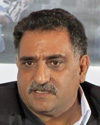This article was translated by the ACRPS Translation and English Editing Department. The original Arabic version can be found here.
The Arab Center for Research and Studies (ACRPS) held a two-day symposium on July 30 and 31 July, 2011, in Doha under the title of "Syria between Choices, Interests and the Possibilities of Change", in which a large group of Syrian intellectuals participated.
In his opening remarks, ACRPS General Director Azmi Bishara emphasized the
importance of being "mature" politically, when discussing the questions which Syria is facing, even in light of the very tense situation on the ground.
Not only was this the modus operandi of any think-tank such as the ACRPS, but also because the public would look to these intellectuals participating in the conference to answer their questions.
Dr Bishara indicated that ACPRS is an independent academic research institute making the point that participants, from Syria and abroad, were invited solely because of their credentials and intellectuals  contributions as published writers, irrespective of their political affiliations, but Dr Bishara went on to note that anybody writing about Syria today was likely to be notable for political associations, as well.
contributions as published writers, irrespective of their political affiliations, but Dr Bishara went on to note that anybody writing about Syria today was likely to be notable for political associations, as well.
In Bishara's words: "There are two aspects to the Syrian question which are of interest to us: one is of general interest, the other concerns Syrian specificity. With regards to the general interest aspect, it includes those features shared with other Arab countries and related to the more broad 'Arab Spring', while there is also an aspect [of the uprisings] which has a Syrian specificity, arising from the nature of the regime in Syria. Its relations and the methods it uses to maintain power, and how this led to a very individual youth uprising and opposition."
The ACRPS Director went on to state: "Repressive regimes are not sustainable; even those who defend these regimes no longer present them as being virtuous, but now work to play on the public's fears and anxieties." Bishara went on to add: "These regimes have tried to use cultural diversity in our society to divide it. There are also two questions which are uniquely Syrian: having an ideological fig-leaf to cover up the repression, and an army which has remained loyal to the regime."
Bishara also went on to suggest that it the probability that the experiences of Iraq and Libya would be repeated in Syria is unlikely to happen, mentioning that foreign intervention would be an insult to the peaceful mass uprising. According to him, the guileless Syrian regime had been degrading by its own ignorance of the scope of the people's uprising and its ability to withstand the repression.
As for the apathy of the new bourgeoisie class constituted of nouveaux riches, together with the remnants of old patrician families, towards the revolt and even its hostility against democracy, they were both explained by the observation that they share common interests together with those in power, according to Bishara.
The ACRPS General Director then explained how "revolutions do not follow the patterns desired by intellectuals; they are not set out in books. These revolutions are not an effort to implement an ideology, but to overthrow despotism and establish democracy."